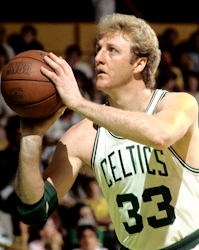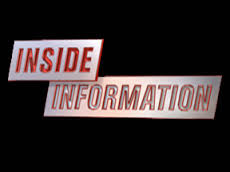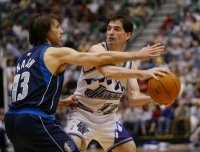 When I think about how fantasy sports has evolved since I first began playing almost 30 years ago, I feel a little like Alexander Graham Bell might feel if he were to see an iPhone.
When I think about how fantasy sports has evolved since I first began playing almost 30 years ago, I feel a little like Alexander Graham Bell might feel if he were to see an iPhone.
No fantasy services existed at the time, so the stats for our first league were kept by hand. The NBA season was 24 weeks long so the first few years, we had eight pay periods and each ran three weeks. The thought of a daily league was as foreign as Siri would be to Alex.
My first excursion was into a basketball league run by a guy who loved Rotisserie Baseball and ran the league in that old-fashioned manner. It was boring and I had no interest in participating in it after one year.
 In the 1987 NBA Finals, which I covered for the Dallas Morning News, I saw an article where Larry Bird described how he determined the best players in the league. He gave players one point for every point, rebound, assist, steal and block and subtracted a point for each missed field goal, free throw, turnover and foul. That seemed like a good system to me, so I formed my first league, naming it, of course, the Larry Bird League and decided that it would be perfect if Bird drew the order of the draft.
In the 1987 NBA Finals, which I covered for the Dallas Morning News, I saw an article where Larry Bird described how he determined the best players in the league. He gave players one point for every point, rebound, assist, steal and block and subtracted a point for each missed field goal, free throw, turnover and foul. That seemed like a good system to me, so I formed my first league, naming it, of course, the Larry Bird League and decided that it would be perfect if Bird drew the order of the draft.
I had covered the Celtics enough during the playoffs for Bird to be a little familiar with me, so before a preseason game in New York, Bird was coming off the floor after warming up and I felt comfortable stopping him in the hallway.
“Remember that article in the Finals where you gave your system for ranking the best players?” I said.
“Yeah.”
“Well, we’re going to have a fantasy league using that system.”
“OK.”
“Would you mind picking the draft order?”
“Sure.”
I think he was surprised that someone would ask him to do that, but, again, it was before a preseason game and I was making everything fast. I had eight index cards with the names of the teams in the league written on them and handed them to him. He shuffled them, handed them to me and I sealed them in an envelope.
Until he retired, Bird picked the draft order every year that I could get to one of his preseason games. When I did cover a Celtics game, there were a number of times I’d go into the Boston locker room and he’d say, “How’s your league going?”
But he did get annoyed with me at times. One year, I went to a Celtics preseason game in Worcester, Mass., walked into the locker room with the index cards and Bird saw me. Not smiling, he said, “Don’t f**k with me.” I immediately did a 180, walked out of the locker room and hoped the Celtics would win the game. Because even though it was preseason, if they lost, Bird would be ticked.
Fortunately, they won and he picked the draft order.
After several years, I decided to remove fouls from the scoring system because there were times when a giving a foul was a good move and a point should not be deducted for a good move. I told Bird about it and also told him the second reason was that superstars tend to get the benefit of foul calls.
“Hell, superstars get all the calls,” he said. Then he laughed.
But he did endorse the decision.
RELATED: Is Daily Fantasy Sports a game of chance? Or skill?
One year, we made T-shirts with “The Larry Bird League” on them and I managed to get Bird’s home address and send him one. He never acknowledged it.
 Over the years, our league grew to as many as 16 teams with writers and NBA team public relations directors across the country participating. Since most of the people in the league had access to players, many players became aware of the league. That led to interesting and comical situations.
Over the years, our league grew to as many as 16 teams with writers and NBA team public relations directors across the country participating. Since most of the people in the league had access to players, many players became aware of the league. That led to interesting and comical situations.
The Celtics had a long preseason trip one year, and in at least three cities, a writer or PR director would either thank Bird because they got a high draft pick or complain because they got a low one.
When the players heard about it, their overpowering competitiveness made them interested in it. During one preseason, David Moore, who was working in Dallas at the time, was interviewing Magic Johnson and told him that he had drafted him. Magic immediately asked where he went in the draft. When Moore said sixth, Magic – insulted – said, “Sixth?!”
Moore explained, however, that since there were so few great centers, guys like Hakeem Olajuwon, Patrick Ewing and David Robinson were drafted early. That seemed to placate Magic, who then asked, “Who we got?”
Moore listed the players and after each one, Magic would nod his head and say, “good . . . good . . . good.” After the last player, Magic again said, “good,” raised his hand and high-fived Moore.
That had to be a highlight in the history of fantasy sports.
In the 1988-89 season, Bird played only six games because he had bone spurs surgically removed in both heels. The Celtics kept saying during the season that he might return and I had drafted him, so I kept him on my team and fell way behind in the league. ‘
Besides awards for yearly totals, there were also significant awards for having the high score each period. So I convinced another team that if Bird came back, he would make that team good enough to win a period or two and we made a trade.
During that season, Bird rarely spoke to the media. But before a Boston game one night, he was on crutches and I saw him in a hallway leading from the locker room to the training room. We said hello and he began walking away, clearly not wanting to talk, so I said:
“I traded you.”
 He turned slowly, limped back to where I was and with a scowl on his face, and said: “You traded me? For who?”
He turned slowly, limped back to where I was and with a scowl on his face, and said: “You traded me? For who?”
“John Stockton and Willie Anderson.”
He looked at me, shook his head and said, “You got f***ed.”
“Larry,” I said defensively. “You’re hurt!” But he hobbled away on his crutches, properly insulted.
Fantasy sports have become so big and so much money is at stake that I’m not sure it would be a good idea for reporters to discuss their fantasy teams with a player anymore. But during that era, the times were simpler, the players were more accessible, and when they became aware of fantasy sports, it was just another way for them to compete.
One of the enjoyable aspects of any sport is its history. For those of us who have been fortunate enough to combine fantasy sports with our jobs, that history is a good one.
Jan Hubbard has written about basketball since 1976 and worked in the NBA league office for eight years between media stints. Follow him on Twitter at @whyhub.